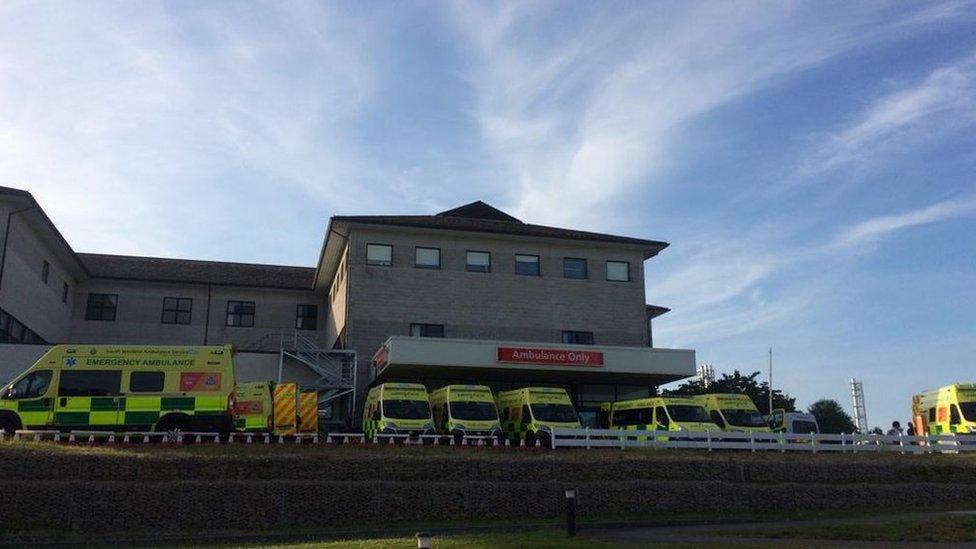Westminster power vacuum leaves NHS struggling
- Published

A Conservative leadership contest and uncertainty over a new Downing Street regime - not to mention Brexit - have left Whitehall in the doldrums.
That isn't just an academic issue - it affects real lives. Critical decisions on social care and health policy in England have been put on hold, with ministers and civil servants unable to reach difficult decisions in the current political vacuum.
First, the NHS - some hospitals are reporting record patient numbers coming through accident and emergency departments in June and this month.
Demand does not usually ease off after the winter though summer brings different types of patients including those with minor injuries from outdoor exercise.
Even so hospital leaders believe there are underlying stresses across the system, including shortcomings in community care of the elderly, which are driving patients into A&E.
The Royal Cornwall Hospital has declared the highest state of alert, known as OPEL 4 or a "critical incident".
Hospitals take this step occasionally, when there is extreme pressure on services. Ambulances are diverted to other hospitals, in this case Penzance, Barnstaple and Plymouth.
Non-urgent surgery is postponed and staff work extra hours to clear the caseload.
This is not unprecedented for a summer month - but it's a reminder of how stretched the NHS can be even in mild weather.
Unfilled rotas
Hospital leaders say their job in these difficult circumstances has been made even tougher by what they see as a government policy failure that has made it harder to fill medical rotas.

Fifteen ambulances were queued up outside Royal Cornwall Hospital on Monday
Rules designed to reduce tax breaks on pension savings for high earners have had unintended consequences.
Working extra shifts has become an unattractive proposition for doctors because three-quarters or more of the pay can be taken in tax.
This is because the more they earn above £110,000 a year, the more they lose in tax relief.
It is a complex issue but the net result is that some doctors and other health staff are no longer prepared to come in for extra weekend work to help clear the waiting list backlog. The same applies to filling rotas in A&E.
The government has proposed changes to the rules, to allow doctors and employers to cut pension contributions. But a consultation process has only just begun.
NHS Providers, representing hospitals and other trusts, says urgent action is needed to prevent a serious deterioration in patient care.
The organisation is frustrated, according to one source, that politicians distracted by Brexit are ignoring clear and present dangers in the NHS and that vital decisions are being ducked.
Social care problem
Then, there is, of course, social care. The repeated postponements of the government's promised policy paper (known as a Green Paper) over two years have been much commented on and criticised.
But leaders and experts in the field are beginning to suspect that it may be some time before anything emerges. Downing Street's bandwidth for domestic policy will be minimal and the political drive needed to make the tricky decisions required on social care is in short supply.

Dementia care is costing people huge sums
This matters hugely to those who need adult social care and those who provide it.
House of Lords committees are not known for eye-catching pronouncements.
But the Economic Affairs Committee did not pull any punches with a report headlined: "Time to end a national scandal".
It called for immediate government action, external, concluding that "with each delay, the level of unmet need in the system increases, the pressure on unpaid carers grows stronger, the supply of care providers diminishes and the strain on the care workforce continues".
The cross-party membership of the Lords committee is heavyweight, its opinions not to be dismissed lightly.
It includes two former Conservative cabinet ministers, Lord Lamont and Lord Forsyth, the former Labour Chancellor Lord Darling and two former senior mandarins, Lord Turnbull and Lord Burns. They are not exactly radicals and mavericks.
So, it was something of a shock to hear they wanted to see an immediate cash injection of £8bn for adult social care in England, then another £7bn annually to provide free personal care (including washing and dressing) to bring England in line with Scotland.
That sounds like a big ask and it is - but the lords believe only a dramatic intervention will work.
The latest research from the Alzheimer's Society, external says that since the government policy paper was first promised, in March 2017, people affected by dementia have had to use £14.7bn of their own savings to cover care costs. This compares with £9.3bn of state funding.
And the society says this is a "shocking" sum of money and that people with dementia and their families are falling victim to a "dreadfully broken system".
Things may become clearer when a new prime minister walks into Number 10 Downing Street.
There may be a sudden new drive and burst of energy to tackle these major domestic issues.
But then again there may be not be, in which case patients and people needing care will feel the consequences.
